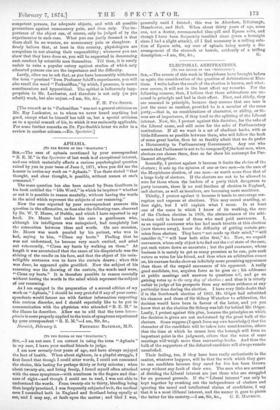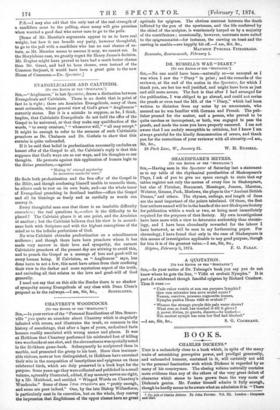ELECTORAL ARBITRATIONS. [To THE EDITOR OF THE "SPECTATOR."J
SIR,—The events of this week in Marylebone have brought before us again the consideration of the question of Arbitrations at Elec- tions. I write before the result of the election is known, and what- ever occurs, it will not in the least affect my remarks. For the following reasons, then, I believe that these arbitrations are un- sound in principle and bad in their effect. First, and chiefly, they are unsound in principle, because they assume that one man is just the same as another, provided he is a member of the same party,—that is, no considerations of character, or ability, or fit- ness are of importance, if they tend to the splitting of the Liberal interest. Now, Sir, I protest against this doctrine, for the sake of the Liberal cause, and still more for the sake of Parliamentary institutions. If all we want is a set of obedient hacks, with as little difference as possible between them, who will follow the beck of some great leader, then let us frankly admit that we do prefer a Dictatorship to Parliamentary Government. Any one who asserts that Parliament is not to be composed:0%th° best men, when electors can choose them, does so far show his contempt for Par- liament altogether.
Secondly, I protest against it because it limits the choice of the electors ; it sets up the opinion of one or two men—in the case of the Marylebone election, of one man—as worth more than that of a large body of electors. If the electors are not to be allowed to vote for those whom the leaders of a party think dangerous to party interests, there is no real freedom qf election in England, and electors, as well as members, are becoming mere machines.
Thirdly, I protest against it because it tends to encourage cor- ruption and expense at elections. This may sound startling, at first sight, but I will explain what I mean. In at least one of the cases in which I know of its working, the case of the Chelsea election in 1868, the circumstances of the arbi- tration told in favour of those who used paid canvassers. I, as an unpaid canvasser who has had much trouble at this election (now thrown away), know the difficulty of getting certain pro- mises from electors. They have " not made up their mind," "will consider it," "will hear both sides first," So. Now, we unpaid canvassers, whose only object is to find out the real state of the case, put such voters down as uncertain ; but the paid canvasser, whose business it is merely to get as many promises as he can, puts such voters as votes for his friend, and thus when an arbitration comes on, his canvass-books show an infinitely more promising appearance than those of the unpaid canvassers of his opponent. A really good candidate, too, acquires force as he goes on ; his addresses at public meetings and answers to questions tell, and go on gaining votes up to the very day of election ; and thus it is utterly unfair to judge of his prospects from any written evidence at any particular time during the election. I have very little doubt that if in the Southwark election of 1869, Mr. 03ger had submitted. his chances and those of Sir Sidney 1Vaterlow to arbitration, the decision would have been in favour of the latter, and yet you know that at the election Sir Sidney was left far behind Mr. Odger. Lastly, I protest against this plan, because the principles on which. the decision is given are not understood by the great bulk of the electors. Some suppose (I speak from my own knowledge) that the character of the candidate will be taken into consideration, others that the time at which he comes into the borough will form an important point in the judgment, others that the votes of mats meetings will-weigh more than canvassing-hooks. And thus the bulk of the supporters of the defeated candidate will always remain unsatisfied.
Their feeling, too, if they have been really enthusiastic in the matter, whatever happens, will be that the work which they gave to one candidate because they cared for him has been thrown away without any fault of their own. The men who are accused of dividing the Liberal interest are just those who are struggled for on personal grounds. If the "Liberal interest" can only be kept together by crashing out the independence of electors and ignoring the moral and intellectual claims of candidates, I say that it is a most illiberal interest, and the sooner it goes to pieces the better for the country.—I am, Sir, &c., C. E. MAtmicz. P.S.—I may also add that the only test of the real strength of a candidate must be the polling, since many will give promises when worried a good deal who never care to go to the polls.
[Some of Mr. Maurice's arguments appear to us to have real weight, but how it can benefit any party, however thoughtful, to go to the poll with a candidate who has no real chance of re- turn, as Mr. Maurice seems to assume it may, we cannot see. In the Marylebone case, we greatly regret Sir Henry James's decision. Mr. Hughes might have proved to have had a much better chance than Mr. Grant, and had he been chosen, even instead of the Common Serjeant, it would have been a great gain to the new House of COHITHODEL—ED. Spectator.]



































 Previous page
Previous page